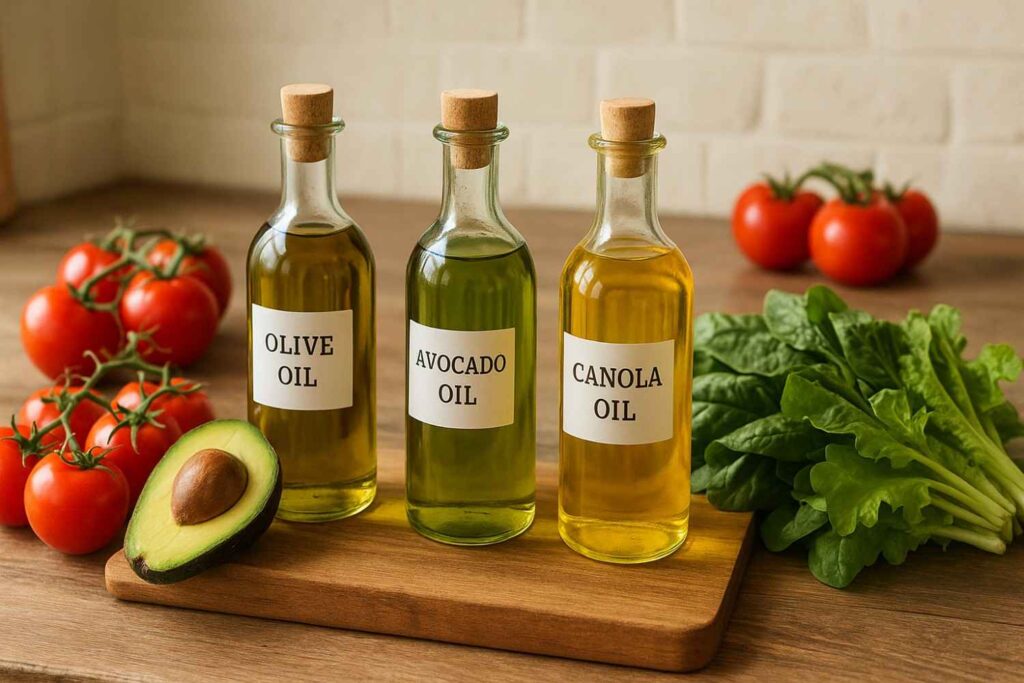Have you ever stood in the grocery store aisle, overwhelmed by cooking oil choices, wondering which one is best for your heart? With marketing buzzwords and diet trends all around, it’s tough to know what’s truly healthy.
In this guide, we’ll simplify everything. You’ll learn:
- The difference between healthy and unhealthy fats
- Which oils are best for your heart (based on science)
- How to use each oil in real-life cooking
- One simple swap you can make today

Why Oil Choice Matters for Heart Health
Saturated vs. Unsaturated Fats
Health professionals consistently recommend replacing saturated fats (like butter or coconut oil) with unsaturated fats found in plant-based oils. According to the American Heart Association, unsaturated fats help lower LDL (“bad”) cholesterol, which reduces your risk of heart disease and stroke.
Monounsaturated and Polyunsaturated Fats
Two types of unsaturated fats—monounsaturated (MUFA) and polyunsaturated (PUFA)—are key to heart health. They’ve been shown to reduce inflammation, improve blood cholesterol, and even lower blood pressure.
Top Heart-Healthy Oils
🫒 Extra-Virgin Olive Oil
Why it’s great:
Rich in oleic acid (a monounsaturated fat) and antioxidants called polyphenols. Long-term studies have shown that olive oil consumption reduces risk of cardiovascular disease, stroke, and even dementia.
Pro Tip:
Drizzle over salads, pasta, or cooked veggies. Avoid using for high-heat frying to preserve its nutrients.
🥑 Avocado Oil
Why it’s heart-healthy:
Contains nearly the same healthy fats as olive oil but with a much higher smoke point, making it ideal for high-heat cooking.
Use it for:
Grilling, roasting, searing.
🌾 Canola Oil
What makes it great:
High in both omega-3 and omega-6 fats, and lower in saturated fat than many oils. It’s a budget-friendly, neutral-tasting oil great for everyday cooking.
Caution:
Like all oils, use in moderation and store in a cool, dark place to prevent oxidation.
🌻 Sunflower & Safflower Oil
Why they help:
Excellent sources of vitamin E and linoleic acid. Safe for high-heat cooking. These oils help lower LDL without raising inflammation when used as part of a balanced diet.
Read More about Sunflower Oil vs Safflower Oil: High Oleic & Gluten Facts
Oils to Limit or Avoid
🥥 Coconut Oil
Though trendy, coconut oil is over 80% saturated fat. Studies have shown it can increase LDL cholesterol levels. Use sparingly.
❌ Trans Fats
Artificial trans fats are banned in the U.S., but check labels. Avoid anything with “partially hydrogenated oils.”
Quick Comparison Table
| Oil | Heart Benefits | Best Use |
|---|---|---|
| Olive Oil | High in MUFA, antioxidants | Drizzle, salad, sauté |
| Avocado Oil | High smoke point, MUFA | Grilling, frying |
| Canola Oil | Low sat fat, omega-3s | All-purpose |
| Sunflower Oil | Vitamin E, PUFA | High-heat cooking |
| Coconut Oil | High sat fat – limit use | Rare baking |
A Personal Perspective
When I first started cooking heart-healthy meals, I swapped butter for olive oil and used canola oil for baking. My total cholesterol dropped within a few months—without changing much else. I now keep three oils in rotation: EVOO for salads, canola for cooking, and avocado oil for roasting.
Final Thoughts
Choosing the right cooking oil can improve your heart health without sacrificing flavor. Stick to plant-based oils high in MUFA and PUFA, and avoid saturated and trans fats when possible.
A study from Harvard Health also supports using seed oils like canola and soybean in moderation, as part of a well-rounded diet.
✅ Try This:
Swap butter or margarine with olive oil this week. Your heart (and taste buds) will thank you.
